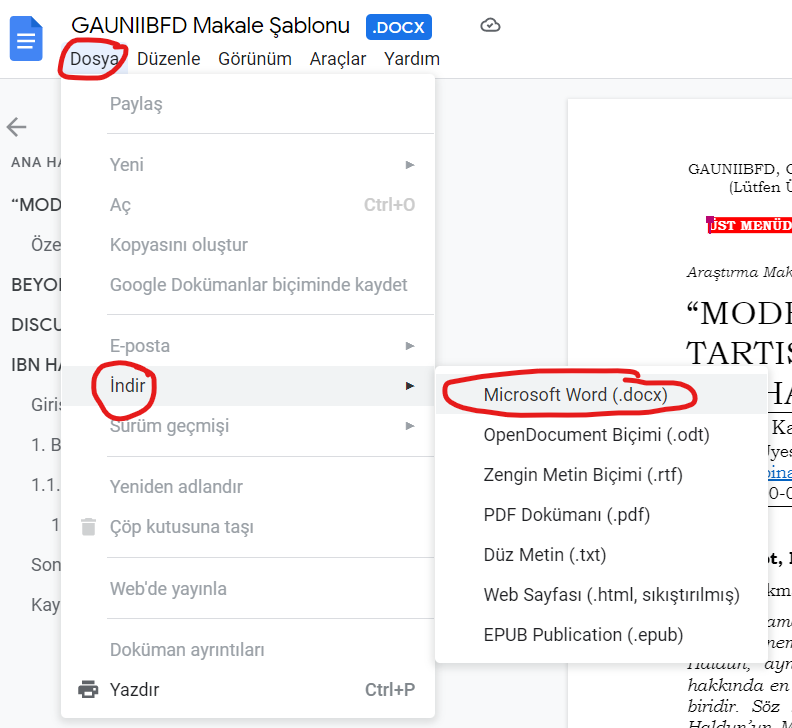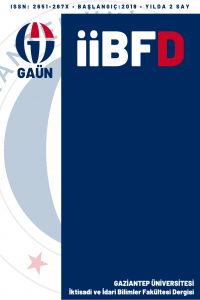Makaleler
Sayı Hakemleri

Amaç ve Kapsam
Dergide iktisat, işletme, maliye, finans, uluslararası ilişkiler, kamu yönetimi, siyaset bilimi ve diğer ilgili alanlarda makaleler yayımlanmaktadır.
Yazım Kuralları
Makaleler Word .docx formatında hazırlanmalı ve Dergipark sistemine yüklenmelidir.
>> MAKALE ŞABLONU İNDİRME BAĞLANTISI <<
Açılan sayfada Üst kısımda yer alan Dosya Sekmesinde İndir > Microsoft Word (.docx) butonunu tıklayarak indirebilirsiniz.

1. Sayfa boyutu A4, kenar boşlukları Üst-Alt-Sol-Sağ: 2,5 cm olarak belirlenmelidir.
2. Yazının başlığı Bookman Old Style 20 punto, büyük harflerle yazılmalıdır.
3. Yazının başlığının altında, Bookman Old Style 12 punto boyutunda yazarın adı-soyadı yer almalıdır. Yazarla ilgili bilgiler (unvanı, çalıştığı kurum, mail adresi ve ORCID) ad soyadın altında Bookman Old Style 10 punto yazılmalıdır.
4. Yazar bilgilerinin ardından, çalışmada 10pt, Bookman Old Style, İtalik, İki Yana yaslı olarak yazılmış en çok 250 kelimelik bir Türkçe özet yer almalıdır. “Özet” başlığı 10 punto ve koyu yazılmalıdır.
5. Çalışmada, ana metin Bookman Old Style yazı tipinde, tek satır aralığıyla, sonra 6 nk paragraf aralıklı ve 10 punto büyüklüğünde iki yana yaslı biçiminde yazılmalıdır.
6. Başlıklar 10 punto ve koyu olarak yazılmalıdır. Numaralandırma Düzeni şablon dosyasında gösterildiği gibidir.
7. Metin içi göndermeler aşağıdaki gibi gösterilmelidir. Üç ve daha fazla yazarı olan eserlerde, ilk yazardan sonraki yazarlara işaret etmek üzere, “vd.” kısaltması kullanılmalıdır. Kurum, kuruluş yayınlarında kurumun varsa kısa adı yoksa tam adı belirtilmelidir.
(Eryılmaz, 2010: 98)
(Eryılmaz ve Biricikoğlu, 2012: 102)
(Eryılmaz vd., 2004: 8)
(DPT, 1986:24)
(Maliye Bakanlığı, 2018:54)
8. Çalışmada kullanılan tablo, şekil veya grafikler 9 punto büyüklüğünde ve tek satır aralığıyla yazılmalıdır. Tablo, şekil ve grafikler sırayla numaralandırılmalıdır. Tablo veya şeklin başlığı üst tarafa, tablonun kaynakçası altına yazılmalıdır. Tablolar, sayfaya ortalı şekilde yerleştirilecektir. Tablo, şekil , görsel vb. açıklaması ilgili nesnenin üzerinde Bookman Old Style 9pt Kalın olacaktır.
Çalışmalarda en az üç, en fazla beş adet anahtar kelimeye yer verilmelidir.
KAYNAKÇA YAZIMI
Çalışmada kullanılan kaynaklar, “kaynakça” başlığı altında çalışmanın sonunda yer almalıdır. 10 punto, Bookman Old Style, İki Yana yaslı, 1,25 cm Asılı biçiminde yazılacak olan kaynakça bölümünde, kullanılan kaynaklar soyadlarına göre harf sırasıyla gösterilmelidir.
Kitaplar
Eryılmaz, B. (2002), Bürokrasi ve Siyaset: Bürokratik Devletten Etkin Yönetime, İstanbul: Alfa Yayınları.
Eryılmaz, B. ve Eken, M. (1993), Kamu Bürokrasisi, İzmir: İzmir Ticaret Odası Yayını.
Eryılmaz, B., Eken, M. ve Şen, M. L. (1995), İşyeri Açma ve Ruhsat İşlemleri, İzmir: İzmir Ticaret Odası Yayını.
Editörlü Kitap
Eryılmaz, B., Eken, M. ve Şen, M. L. (Ed.) (2007), Kamu Yönetimi Yazıları, Ankara: Nobel Yayıncılık.
Editörlü Kitapta Bölüm
Eryılmaz, B. (2007), “Değişen Kamu Yönetimi Anlayışı ve Bürokrasi”, Dönüşüm Sürecindeki Türkiye (Ed. D. Dursun, B. Duran ve H. Al), İstanbul: Alfa.
Makaleler
Eryılmaz, B. (2002), “Belediyelerde Demokrasi Geleneği ve Değişim İhtiyacı”, Çağdaş Yerel Yönetimler Dergisi, 11 (3), s. 6-21.
Eryılmaz, B. ve Biricikoğlu, H. (2011), "Kamu Yönetiminde Hesap Verebilirlik ve Etik", İş Ahlakı Dergisi, 4 (1), s. 19-45.
Fossestøl, K., Breit, E., Andreassen, T. A. & Klemsdal, L. (2013), “Managing Institutional Complexity in Public Sector Reform: Hybridization in Front-line Service Organizations”, Public Administration, 93 (2), p. 290-306.
Sempozyumda Sunulan Bildiri
Eryılmaz, B. (2004), “Kamu Yönetiminde Değişim”, II. Kamu Yönetimi Forumu (KAYFOR), 7-8 Ekim, Hacettepe Üniversitesi, İktisadi ve İdari Bilimler Fakültesi Kamu Yönetimi Bölümü, Beytepe Kampüsü, Ankara.
Sempozyum Kitaplarında Tam Metni Yayınlanan Bildiri
Eryılmaz, B. (1989), “İl Özel İdarelerinin Mahalli İdare Sistemi İçindeki Yeri”, İl Özel İdareleri Başta Olmak Üzere Mahalli İdareler ve Toplum Kalkınması Sempozyumu, Ankara: DPT.
Resmî Kurumlar Tarafından Hazırlanan Özel Yayınlar, Raporlar vb.
Devlet Planlama Teşkilatı (2000), Kamu Mali Yönetiminin Yeniden Yapılandırılması, Özel İhtisas Komisyonu Raporu, Ankara: DPT Yayınları.
Tezler
Eryılmaz, B. (1984), Bayındırlık Hizmetlerinin Yürütülmesinde Merkezi İdare-Mahalli İdare İlişkileri, Yayınlanmamış Doktora Tezi, Dokuz Eylül Üniversitesi Sosyal Bilimler Enstitüsü, İzmir.
İnternet Kaynakları
Curry, D. (2014), “The Crystal Ball of Public Administration Reform: What Future Predictions Tell Us about the Present. COCOPS Working Paper, No. 15, http://www.cocops.eu/wp-content/uploads/2014/06/WP15.pdf, (Erişim Tarihi: 21.01.2021).
Haynes, P. (2011), “The return of New Public Management?”, http://papers.ssrn.com/sol3 /papers.cfm?abstract_id=1935909, (Erişim Tarihi: 14.01.2021).
Yukarıdaki kurallarda yer verilmeyen farklı nitelikteki metin ve kaynaklara referans gösterim biçimleri için APA6 Kaynak Gösterim kılavuzundan yararlanılabilir.
Etik İlkeler ve Yayın Politikası
Gaziantep Üniversitesi İktisadi ve İdari Bilimler Fakültesi Dergisi yayın politikasında akademik ilke ve etik değerlere bağlıdır. Etik ilke ve değerlere ilişkin ulusal ve uluslararası standartlara uygun olarak yayın hayatını sürdürmektedir. Bu kapsamda, COPE (Committee on Publication Ethics) tarafından belirlenen standartlar ve YÖK "Bilimsel Araştırma ve Yayın Etiği Yönergesi"nde belirlenen esaslar dikkate alınmaktadır ( https://publicationethics.org/ & https://www.yok.gov.tr/Sayfalar/Kurumsal/mevzuat/bilimsel-arastirma-ve-etik-yonetmeligi.aspx). Makale değerlendirme sürecinde kabul edilen araştırma ve yayın etiği standartlarına aykırılığı tespit edilen eserlerin yayın talebi reddedilir. Eserin yayınlanmasından sonra söz konusu aykırılığın tespit edilmesi halinde eser yayından kaldırılır.
*Aşağıda belirtilen esaslar, COPE ve YÖK tarafından belirtilen standartlar esas alınarak hazırlanmıştır.
Yazarların Sorumluluğu
Eser Dergiye gönderilmeden önce, Derginin benimsediği etik standartlara, yayın ilkelerine ve yazım kurallarına uygun olup olmadığını kontrol ve teyit eder.
Eserin araştırma ve yayın ilkelerine uygun olarak hazırlanması yazar(lar)ın sorumluluğundadır. Yazar, eseri göndermekle 5846 sayılı Fikir ve Sanat Eserleri Kanuna, YÖK Bilimsel Araştırma ve Yayın Etiği Yönergesine, COPE tarafından açıklanan araştırma ve yayın etiği standartlarına uygun olarak eserin hazırlandığını taahhüt eder.
Hakemlerin Sorumluluğu
Hakem kendisine gönderilen eseri COPE tarafından açıklanan esasları dikkate alarak değerlendirmesini tamamlar ve kendisine tanına süre içinde editör kuruluna iletir.
Editör ve Editör Kurulunun Sorumluluğu
a) Tarafsızlık: editör, eser sahibinin dininden, cinsiyetinden, uyruğundan ve siyasi görüşünden bağımsız olarak eserlerin değerlendirme sürecini yürütür.
b) Gizlilik: Yayın sürecinde kör hakemlik esasının korunmasını sağlar. Ayrıca yazar ile hakem arasında çıkar çatışmasının oluşmasını engelleyecek tedbirleri alır.
c) Adaletlilik: Hakem sürecinin etik standartlara uygunluğu açısından COPE rehberini dikkate alır.
d) İşbirliği ve koordinasyon: Eserlerin değerlendirme sürecinin öngörülen sürede tamamlanması için gerekli işbirliği ve koordinasyon sağlanır.
e) Bilgi paylaşımı: Kurulda görevli diğer kişilerle derginin yayın süreci ve makale değerlendirme süreçleri hakkında bilgi paylaşımında COPE tarafından belirlenen esasları gözetir.
f) Etik ihlalleri: Dergiye yayınlanması için gönderilen veya Derginin önceki sayılarında yayınlanmış bir esere ilişkin olarak,
Mükerrer yayın, dilimleme, intihal, uydurma veri, çıkar çatışması ve haksız yazarlık şüphesi oluştuğunda;
Yazarlık değişiklikliği talepleri hakkında COPE tarafından belirtilen standartlara riayet eder. Ayrıca COPE tarafından yayınlanan mükerrer yayın ve dilimleme açısından ve/veya haksız yazarlığa ilişkin hususlara dikkat eder.
1. Dergiye gönderilen makalelerden değerlendirme ücreti ve başvuru ücreti alınmamaktadır.
2. Dergide yayımlanan çalışmalar için yazar(lar)a telif ödemesi yapılmamaktadır.
3. Gaziantep Üniversitesi İktisadi ve İdari Bilimler Fakültesi Dergisi’ne gönderilecek makalelerde imlâ ve noktalama kurallarına uyulması, en çok önem verilen hususlardan biridir.
4. Gaziantep Üniversitesi İktisadi ve İdari Bilimler Fakültesi Dergisi’ne gönderilecek makalelerin atıf yapma ve kaynak gösterme düzeni, APA ya göre yapılmalıdır.
5. Gaziantep Üniversitesi İktisadi ve İdari Bilimler Fakültesi Dergisi'ne gönderilen yazılar daha önce hiçbir yerde yayımlanmamış ve hâlihazırda yayınlanmak üzere sunulmamış olmalıdır.
6. Makaleler Türkçe veya İngilizce dillerinde yazılmış olmalıdır. Dergide yayımlanan çalışmaların bilim ve dil bakımından sorumluluğu yazar/yazarlarına aittir.
7. Dergimizde sadece akademisyenlerden gelen çalışmalar değil, araştırmacı ve uygulamacılardan gelecek çalışmalarda değerlendirmeye alınacaktır.
8. Makaleler, yazım kuralları sayfasında bulunan makale şablonu doldurularak hazırlanmalı ve .docx formatında kaydedilerek Dergipark sistemine yüklenmelidir.
9. Makaleler, öncelikle, ön kontrol aşamasında, Yayın Kurulumuz tarafından değerlendirmeye alınıp bilimsel içeriği itibariyle alanında literatüre katkı sağlama niteliğindeki makaleler hakemlik sürecine dâhil edilecektir.
10. Dergimize gönderilen makaleler şekil ve içerik yönünden ön incelemesi yapıldıktan ve intihal programında taratıldıktan sonra en az iki hakeme gönderilmektedir. Hakemlerden olumlu görüş alınan yazılar yayım sürecine alınır. Hakeme gönderilen makaleler geri çekilemez. Hakemlerden bir olumlu ve bir olumsuz rapor alınması halinde çalışma Editör Kurulu tarafından uygun görüldüğü takdirde üçüncü bir hakeme gönderilir. Herhangi bir şekilde yazarlardan veya üçüncü şahıslardan hakem önerisi alınmaz. Hakem atamaları, editör kurulu tarafından yapılır.
11. Dergide yayımlanmak üzere gönderilen makaleler araştırma ve yayın etiği kurallarına uygun olarak hazırlanmış olmalıdır. Yapılan araştırmalar için ve etik kurul kararı gerektiren klinik ve deneysel insan ve hayvanlar üzerindeki çalışmalar için ayrı ayrı etik kurul onayı alınmış olmalı, bu onay makalede belirtilmeli ve belgelendirilmelidir. Etik kurul izni gerektiren çalışmalarda, izinle ilgili bilgiler (kurul adı, tarih ve sayı no) yöntem bölümünde ve ayrıca makale ilk/son sayfasında yer verilmelidir. Olgu sunumlarında, bilgilendirilmiş gönüllü olur/onam formunun imzalatıldığına dair bilgiye makalede yer verilmesi gereklidir. Dolayısıyla etik kurul izin belgesi gerektirdiği halde bu belgeyi göndermeyen makaleler değerlendirmeye alınmayacak ve reddedilecektir.
12. Değerlendirme süreci tamamlanan makalelerin ne zaman ve hangi sayıda yayınlanacağı Editör Kurulu tarafından tayin edilir. Yayına kabul edilen makaleler için yazar(lar)a DergiPark aracılığıyla yayına kabul e-postası gönderilir.
13. Değerlendirme süreci tamamlanmış makaleler, editör kurulunun görüşü ile herhangi bir sayıda yayınlanabilir
14. Bir yazar (çok yazarlı olsa bile) bir yılda birden fazla makalesi özel sayılar dahil yayınlanamaz.
15. Bir yazar (çok yazarlı olsa bile) bir yılda birden fazla makale gönderemez.
16. Gaziantep Üniversitesi İktisadi ve İdari Bilimler Fakültesi Dergisi'nde özgün araştırmaların dışında zaman zaman çeviriler de yayımlanmaktadır. Yapılan çevirinin nerede yayınlandığını gösterir kopyası, yazar/lar'ın ve ilk yayının yapıldığı derginin onayı ile birlikte yazının eki olarak dergiye gönderilmelidir.
17. Hakemlerden gelen raporlar doğrultusunda, makalenin yayınlanmasına, rapor çerçevesinde yazar(lar)dan düzeltme, ek bilgi ve kısaltma istenmesine veya yayınlanmamasına karar verilmekte ve bu karar yazar(lar)a sistem üzerinden bildirilmektedir. Yazar(lar), hakemler tarafından istenilen bütün değişiklikleri yapmakla yükümlüdür. Yazarlar istenilen değişiklikleri belirtilen sürelerde yapmazlar ise makaleleri iade edilir.
18. Yayınlanan makaleler, Açık Erişim Politikamız ve Creative Commons lisansı gereğince, kaynak gösterilmek şartıyla kullanılabilir.
19. Dergide yayımlanan yazılardaki görüşler ve bu konudaki sorumluluk yazarlarına aittir.
20. Çalışmaların orijinalliği, en çok önemsenen hususlardan biridir. Bu sebeple salt yazın taraması ya da bibliyometrik analiz vb. çalışmalara dergimizde yer verilmemektedir.
21. Araştırma konusu makale ve yazı herhangi bir kurum tarafından destek görmüş veya tezden üretilmiş ise bu durum, yazar bilgilerinin yer aldığı dosyada belirtilmelidir.
22. Yayın ilkelerine uygun olmayan makalelerin başvuruları kabul edilmeyecektir. Eksiklikleri sonradan tespit edilen makalelerin ise hangi aşamada olduğuna bakılmaksızın değerlendirme süreci sonlandırılacak ve makale iade edilecektir.
Ücret Politikası
Dergimizde makale gönderim, değerlendirme ve yayınlama süreçlerinde herhangi bir ücret talep edilmemektedir.




